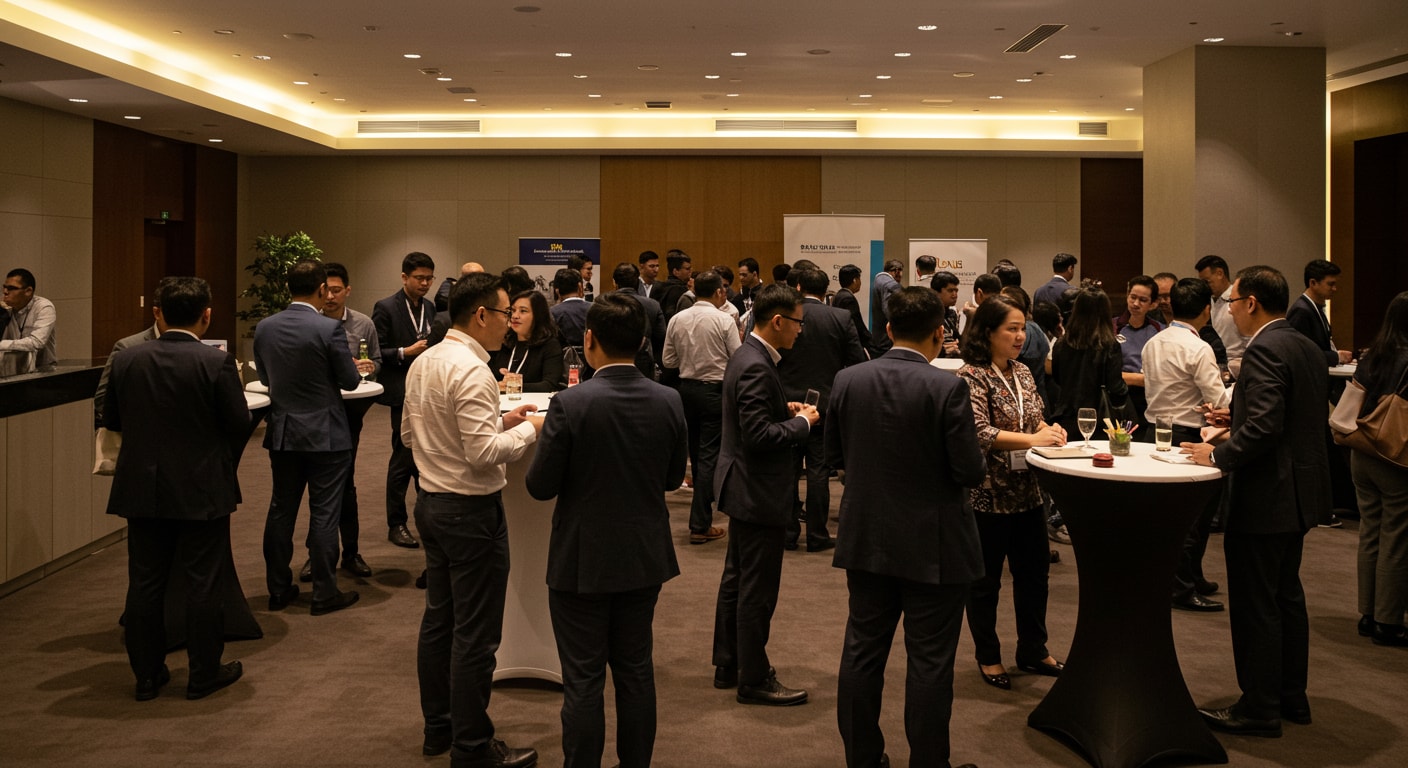In Brunei, many businesses still treat collaboration as a series of one-off projects. A supplier might join for a single campaign, a partner signs on for a short-term deal, or two companies work together until the invoice clears. Then it ends. At first, this feels natural. After all, partnerships are often tied to immediate needs. But what if short-term thinking is holding back long-term growth?
Brunei’s future economy will be shaped less by one-off partnerships and more by lasting ecosystems. Businesses that learn to collaborate beyond campaigns will find resilience, savings, and growth that outlast market shifts. These are the kinds of long-term collaborations that will drive sustainable success and foster innovation across industries. The Brunei business ecosystem, when nurtured with long-term strategies and consistent collaboration, can transform challenges into opportunities and create a competitive advantage that benefits all stakeholders.
Building a robust ecosystem requires commitment, trust, and a willingness to invest in relationships that extend beyond immediate gains. It is about fostering a culture where collaboration, innovation, and shared value are prioritized for the collective success of the business community. This approach not only strengthens individual companies but also enhances the overall resilience and adaptability of the market, making it more resilient in Brunei Darussalam.
Why Short-Term Partnerships Hold Businesses Back
Brunei’s business landscape is filled with partnerships that sparkle briefly before fading out. For example, an F&B outlet may partner with a delivery service, or a boutique store may team up with an influencer, but once the campaign ends, so does the relationship. Many of these challenges stem from the short-term focus that originates from the highly competitive and resource-limited environment. This stop-and-go approach has been the norm for years, creating gaps in consistency. Customers lose interest, momentum stalls, and businesses return to chasing the next short-term solution.
The deeper challenge lies in the transactional nature of these collaborations. While they may deliver spikes in attention or sales, they rarely contribute to long-term resilience. In a small market like Brunei Darussalam, where word-of-mouth, loyalty, and trust carry enormous weight, building ecosystems offers a far more sustainable approach. Moving from transactional deals to strategic, ongoing collaborations is essential to develop the full potential of the Brunei business ecosystem. Effective decision-making is crucial in this context, as it determines how organisations align their actions to build robust and lasting business ecosystems.
Key Takeaways
Ecosystems multiply opportunities across players. By staying connected beyond one campaign, businesses can share leads, co-market products, and expand reach without incurring extra costs. Trust compounds with consistency: repeated collaboration builds reliability. Customers notice when partners work together regularly, and that consistency signals credibility, making every party more trustworthy.
Shared resources reduce cost pressures. From co-branded events to shared logistics, ecosystems lower the cost of growth. A strong network can provide solutions that would otherwise be too expensive to manage individually. Small markets like Brunei thrive on long-term ties. The business community is tight-knit, and ecosystems help leverage this by creating stable relationships that reduce the risks of isolation. This creates more resilience against market shocks through effective strategies and collaboration. In addition, ecosystem collaboration enables access to specialised expertise and new markets, further strengthening the network’s value.
Innovation grows from collaboration. When businesses work together consistently, they share knowledge and test ideas faster. This cross-pollination leads to creative solutions that single companies cannot achieve alone. Ecosystems are the best approach for long-term success. Even if one partner exits, the network remains. The strength of the ecosystem lies in its adaptability, ensuring collective continuity over individual volatility. Ongoing collaboration is essential to ensure that innovation remains sustainable and relevant in a changing market.
Finally, business and societal resilience are interconnected. Building strong ecosystems supports both and business and societal stability, showing how business and community needs align for greater resilience.
Why Brunei Businesses Struggle With Collaboration
There is a persistent challenge in Brunei’s market regarding collaboration, as partnerships are both essential and fragile. The challenge is not in finding collaborators but in sustaining those relationships beyond a single event or transaction. For many SMEs in Brunei Darussalam, partnerships are often tied to promotions or seasonal campaigns. Once that window closes, the partnership ends. This creates bursts of activity with no continuity. Customers who may have been introduced to a collaboration do not see the value repeated, and so the impact fades.
Cultural expectations also shape collaboration. Many businesses prefer to keep operations within family circles or trusted inner groups. While this ensures reliability, it can limit the diversity and creativity that wider ecosystems bring. Social and cultural factors play a crucial role in shaping how businesses collaborate, influencing trust and openness to new partnerships. Building trust across different industries or backgrounds takes time and consistency, but many companies abandon partnerships too quickly when results are not immediate. However, businesses that develop the capacity to work and communicate effectively across diverse backgrounds are better positioned to create resilient and innovative collaborations.
Businesses need to have a clear approach to measurement and assessment. Measurement remains a significant barrier as well. Businesses often track how much a partnership earned in sales but rarely measure how it strengthened reputation, expanded reach, or built community trust. It is important to assess the level of collaboration achieved, not just the financial outcomes, to fully understand the partnership’s impact. Without these metrics, the value of long-term collaboration is underreported, reinforcing a cycle of short-term deals.
Ecosystem Strategies That Actually Work
Anchor partnerships first
Start by identifying one or two key partners you can consistently rely on. This could be a supplier, distributor, or complementary service provider. Anchor partnerships are often established through the development of clear communication channels and shared objectives by the involved parties. Use these relationships as the foundation of your ecosystem, fostering stability, trust, and mutual growth.
Expand through value alignment
Seek partners whose values align with yours, not just their products. For instance, an eco-conscious café might collaborate with a sustainable packaging supplier, a green logistics provider, and local farms. Shared values deepen trust and make collaboration more natural. Effective leadership inspires leaders to nurture value-aligned partnerships, empowering teams to drive meaningful and sustainable growth.
Create shared platforms
Ecosystems grow stronger when there are platforms for ongoing collaboration. Some of these platforms operate under the framework of regional trade agreements or the auspices of industry partnerships, providing a structured environment for cooperation. This could be a joint loyalty program, a shared online marketplace, or co-branded community events. These initiatives keep the network visible and useful beyond one-off deals.
Make knowledge exchange a habit
Encourage regular sharing of insights through quarterly meetings, workshops, or digital channels. In an environment where collaboration is key, regular knowledge exchange becomes essential for staying competitive. The more partners learn from each other, the faster they can innovate and adapt. A culture of knowledge exchange ensures the ecosystem’s growth.
Real-World Success: Brunei’s Local Food Alliance
The Local Food Alliance provides a strong example of ecosystem success in Brunei. Several small F&B businesses began by collaborating on occasional pop-up events, which brought temporary sales spikes. The real challenge came when import costs rose sharply, squeezing margins. This marked a turning point in the development and growth of the Local Food Alliance, as members sought new strategies to ensure sustainability.
In response, the alliance formalized their collaboration. They shared bulk purchasing of ingredients, co-marketed seasonal products, and launched a joint delivery channel. By working together, the alliance was able to reduce costs and expand their market reach. Within six months, the alliance achieved impressive results:
- Ingredient costs dropped by 15 percent through shared purchasing
- Collective online campaigns reached over 80,000 Bruneians
- Each business reported an average of 20 percent higher repeat orders
- The alliance generated BND 50,000 in additional revenue across members
This ecosystem did not just save money, it gave these businesses resilience and visibility that no single café or restaurant could achieve alone.
Building Your Collaboration Framework
To build ecosystems that last, businesses need more than good intentions. They need structure, and is essential for creating a framework that sustains ecosystems over time. Start by mapping your ecosystem on paper. List partners, their roles, and the value they bring. Then define outcomes that matter most, such as cost savings, customer loyalty, or new market entry.
Set measurable indicators for each outcome. For cost savings, track shared logistics or bulk purchasing reductions. For loyalty, monitor repeat customers across the ecosystem. For market entry, measure how many new customer groups each partner reaches through collaboration.
Finally, establish a rhythm of review. Quarterly check-ins with partners allow progress to be evaluated, goals to be refined, and commitment to be renewed. A clear framework ensures ecosystems remain focused and valuable rather than drifting into informal arrangements.
Common Mistakes to Avoid in Ecosystem Building
One major mistake is treating partnerships as short-term campaigns. When collaboration ends as soon as a poster is taken down, opportunities for deeper value are lost.
Another pitfall is chasing partnerships purely for visibility. Partnering with a big name may bring attention, but without operational or strategic alignment, the benefits fade quickly.
Some businesses also neglect the partner experience. Just as customer experience matters, so does how easy and rewarding it is to work with you. If a partner feels undervalued or overburdened, they will not stay in the ecosystem.
Finally, many companies stop measuring outcomes after the first success. Sustained ecosystems require continuous tracking of shared value, not just one-time gains. Ongoing evaluation is essential to the achievement of long-term ecosystem goals, helping guide efforts to the desired outcomes and preventing enthusiasm from fading as networks dissolve.
Getting Started: Ecosystem Activation Timeline
Week 1: Network Mapping:
List your current and potential partners. Identify overlaps in customers, resources, or values. Look for areas where collaboration feels natural and mutually beneficial. To succeed, it’s essential to have a clear plan for ecosystem activation from the start.
Week 2: Value Translation:
Define how collaboration creates shared benefits. For example, a logistics provider gains consistent clients while a retailer lowers delivery costs. Make these benefits clear to all parties.
Week 3: Platform Development:
Choose one initiative that keeps the ecosystem active, such as a joint event, loyalty program, or co-marketing plan. Start small but consistent, creating visibility and structure.
Week 4: Review and Reinforce:
Hold a joint review at the end of the first month. Discuss results openly, refine agreements, and set goals for the next quarter. This ensures momentum continues and prevents partnerships from becoming stagnant.
FAQ
- What is a business ecosystem in Brunei?
A business ecosystem in Brunei is a network of interconnected companies, organisations, and partners that collaborate to create value, share resources, and drive innovation within the local market. Understanding what is unique about Brunei’s business ecosystem helps businesses leverage local strengths and build resilient partnerships. - How do I convince potential partners to commit long-term?
Show them the data. Demonstrate how consistent collaboration creates savings, customer loyalty, or stronger branding compared to short-term campaigns. - What if a partner drops out?
Ecosystems are resilient because they are networks, not single chains. If one member exits, others continue, and new partners can be added. - Do ecosystems only work for larger businesses?
No. SMEs often benefit the most because ecosystems lower costs and expand reach without major investment. Small businesses gain visibility and credibility by being part of trusted networks. - How do I measure success beyond money?
Track loyalty, repeat orders, brand sentiment, and partner retention. These are equally important indicators of ecosystem strength.
Final Thoughts
Brunei’s future economy will be shaped less by one-off partnerships and more by lasting ecosystems. Businesses that learn to collaborate beyond campaigns will find resilience, savings, and growth that outlast market shifts. When nurtured with long-term strategies and consistent collaboration, the Brunei business ecosystem can transform challenges into opportunities.
At Digital Sage, we help SMEs and growing enterprises move from transactional partnerships to thriving ecosystems. From mapping networks to building digital platforms for collaboration, we guide businesses in creating systems that endure. If you are ready to build partnerships that do not end when the posters come down, reach out. Let us work together to create ecosystems that stand the test of time.




